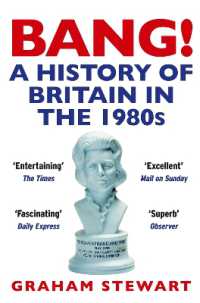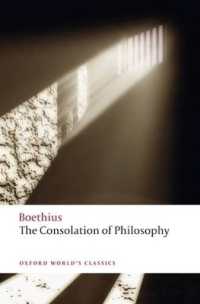- ホーム
- > 洋書
- > ドイツ書
- > Humanities, Arts & Music
- > History
Full Description
When German troops marched into Poland on 1 September 1939, this also affected sport - sometimes dramatically. Official propaganda no longer viewed football as a game that was played for fun, but one that could be instrumentalized for political goals and military strategy. Due to the unpredictability of the game, football did not appear to be well suited to such a purpose. However, as the sport was able to create a politically neutral space that offered exciting entertainment and an escapist distraction, it was eminently important for the dictatorship. Soldiers and the civilian population benefited from this, as did the National Socialist regime itself. Football was vital for the war effort and also helped to stablilize the system precisely because it was not a vehicle for political propaganda. In this edited volume, an international team of authors examines the development of football during the Second World War in a dozen European states. The volume concludes with essays on the representation of the topic in the arts and the media.
Contents
CONTENTS: Markwart Herzog: Introduction: Football: A Myth Machine. The Second World War, National Socialism and Anti-fascism - Ulrich Matheja: The German National Team: From the Last International Match During the War in 1942 to the First Postwar International Match in 1950 - David Forster/Georg Spitaler: Viennese Football Players and the German Wehrmacht: Between «Duty» and Evasion - Walter M. Iber/Harald Knoll: Football in Graz during the Second World War: The Traditional Clubs SK Sturm and GAK from 1939 to 1945 - Jürg Ackermann: Between Political Instrumentalization and Escapism: Spanish Football during the Second World War - Marco Impiglia: Football in Rome during the German and Anglo-American Occupation (1943-1945) - Christian Koller: Neutrality as the Norm? Football and Politics in Switzerland during the First and Second World Wars - Grégory Quin/Philippe Vonnard: Switzerland's International Matches during the Second World War: Sport and Politics, Continuities and Traditions - Fabian Brändle: War Heroes or «D-Day Dodgers»?: English «Wartime Football» - Gary Armstrong/Matthew Bell: Bombs on Seats: Football and the Consequences of War in an English City - Manfred Lämmer/Haim Kaufmann: Football in the British Mandate for Palestine during the Second World War - Alexander Friedman: Football in the Occupied Soviet Territories: Leisure and Entertainment, Sport and Health, Politics and Ideology - Maryna Krugliak/Oleksandr Krugliak: Football during the Nazi Occupation of Kiev: A Contribution to the History and the Historical Context of the So-Called Death Match in Kiev - Victor Yakovenko: Football in Occupied Zhytomyr (1941-1943): An Oasis of Normality amid War, Occupation and Genocide - Dejan Zec: Football in Occupied Serbia (1941-1944) - Thomas Urban: Football «Only for Germans», in the Underground and in Auschwitz: Championships in Occupied Poland - Martin Hoffmann: Football on the Front Line: The Silver Tassie, an Opera by Mark-Anthony Turnage - Markwart Herzog: Football as Politically Neutral Entertainment during the Nazi War: Content and Impact of Robert Adolf Stemmle's Romantic Football Movie Das große Spiel - Jan Tilman Schwab: The Kiev Death Match: A Myth and Its Various Manifestations in Cinematic and Literary Works.








